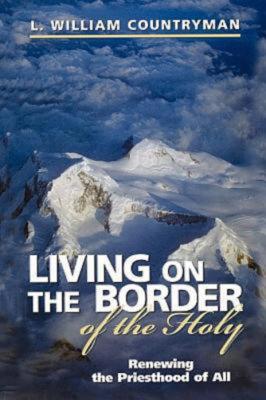Friday Five: Priesthood
I’ve just finished a great little book by L. William Countryman called Living on the Border of the Holy: Renewing the Priesthood of All. Countryman
suggests that not only do all Christians have a ministry, but all of us
have a priesthood. The “priesthood of all believers” comes to mind, and
he takes that farther to suggest that humanity shares a ‘universal
human priesthood’. Every human has the capacity to encounter and then
pass on something of transcendent significance.
Countryman
suggests that not only do all Christians have a ministry, but all of us
have a priesthood. The “priesthood of all believers” comes to mind, and
he takes that farther to suggest that humanity shares a ‘universal
human priesthood’. Every human has the capacity to encounter and then
pass on something of transcendent significance.For today, think back over your life, and share about five (or more) who have been priests in your life (or ministers, pastors, whatever language is comfortable for you). In sharing, know that names are not necessary.
Do share a link in the comments here if you play along today on your blog. We’d love to read about your richness of experience.
Mary Beth is a friend of mine and I appreciate so much her willingness to post this FF today. In our diocese the priesthood of our denomination often times is over fixated on how different the vocation of 'priest' is from the 'lay person'. The ordained priesthood, in my mind, is not any higher or more important than any lay person who is living his/her Baptismal vows. It is just a bit different.
I haven't read Bill Countryman's new tome. He was one of my profs when I was working on my doctorate, so I know the person and can guess what he might have said. Bill is a biblical scholar whom I respect and know that he has based what he has said deeply in Scripture. He is also an ordained gay man who has had to struggle with the Church and all the vagaries of what that has meant both professionally and personally over the past 30 years.
I understand the role of priest as one who points to the Holy One and I have many 'priests' in my life, lay and ordained, two legged and four, because I get it that the whole Creation shouts out the presence of God. With that in mind...
1. The first priest in my life was a Sister. A Roman Catholic nun who pointed me to prayer that allowed God to enter my life in a conscious way. Lorene helped me to see where God was and gave me a vocabulary to describe that experience.
2. Back in my adolescence, there was the mother of one of my schoolmates who taught me about love. Along with my
grandmother, they are the people who introduced me to people who allowed me to touch the love of God. As I grew up, Charlotte was always there, not in an obtrusive way. But we were able to pick up where we had left off no matter how many years there were in between. I would visit when I visited my hometown. And then, when it was time, her husband and children gave me the singular honor of performing her funeral.
3. I have had cats since I was a child. But one, Gizmo, a little grey rescue taught me about fidelity. She didn't start our as 'my' cat, but over the years
she became that. She was with me 18 years. I have one now that is beginning to worm her way into my heart the same way. But Gizmo was a witness to me of how creaturehood signs who God is.
4. Those who know me know that I live with one of the first women priests in the Episcopal Church. And while J has been Priest for me at times, she is also what NOT PRIEST means in my life. She is that friend who has just been there for me for almost 40 years. I met her at a gathering of women in ministry back in 1975 that was organized by Mary Bruggemann (yes, Walter's 1st wife). She did not intrigue me so much as a sacramental sign, but as a woman who had been called. We have seldom had to be priest for each other. We are not wife for each other either. We are simply sisters who have journeyed together, more like Cleopas and his companion on the road to Emmaus and our hearts have been warmed on the way.
5. In 1988 I was called as only the 3rd or 4th woman rector in the Diocese of Washington, DC. It was a lonely business. My parish was wonderful but J. was 5 hrs. away and long-distance calls were expensive. I had one colleague who was also a woman rector in my deanery. We would meet for lunch once a month and would laugh ourselves silly about having to dodge the problems in our parishes, the aggravation of unenlightened men both lay and ordained, sharing what it meant to be the visible. +Jane Dixon went on to be the 2nd woman bishop in our denomination. And she became MY bishop. Both of us were able to live into the sacramentality of that relationship. She always said, “I am a symbol of the inclusiveness of God" and she was the sign of Christ present both in her friendship and in her episcopacy.
Bonus: I have a rector who is my pastor and boss who is truly a priest for me. After 30 years of being a priest, it is really nice to have one of my own. Melanie is the age of a daughter if I had one. Yet she has a vision of what it means to be Christ's own in the Church that has expanded mine. She is a colleague, but she signs for me so many times the best in myself and highlights it for me. And more and more both J and I are in need of a pastor, a sacrament of God's love.

